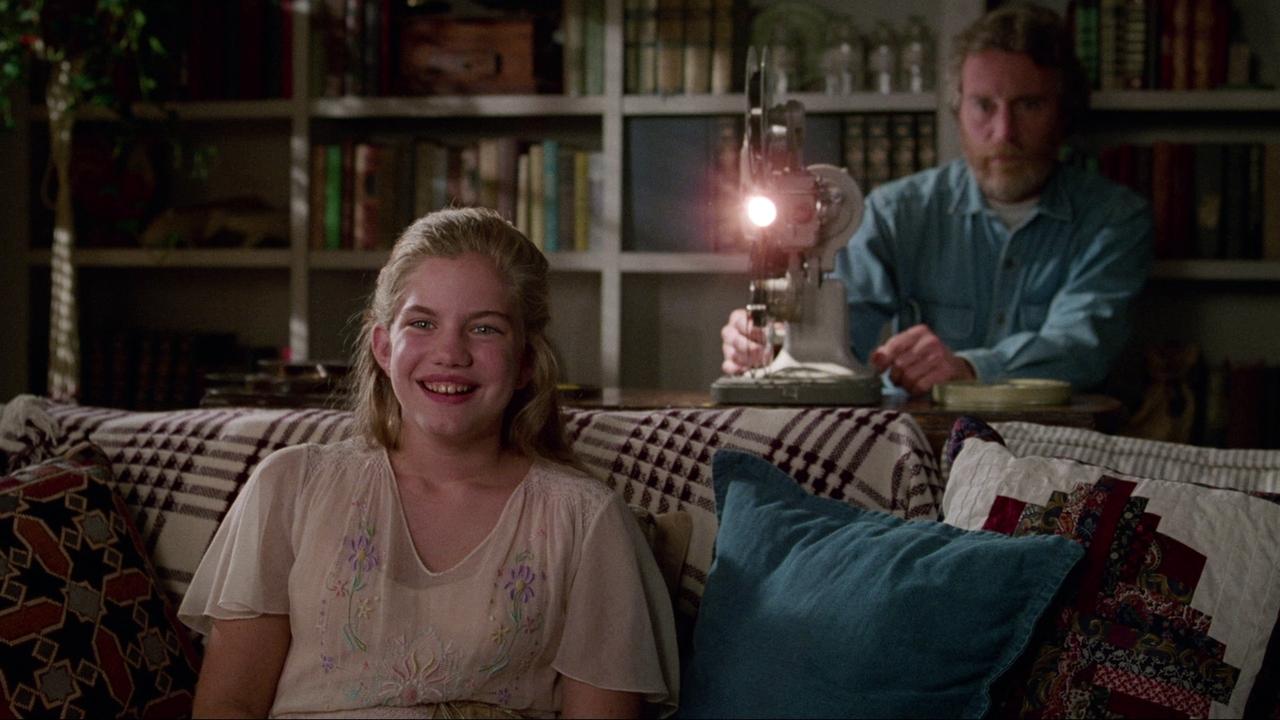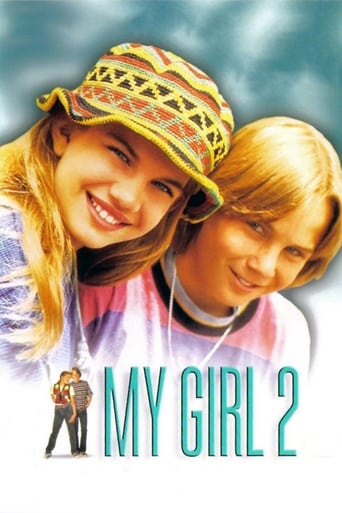Solidrariol
Am I Missing Something?
Sameer Callahan
It really made me laugh, but for some moments I was tearing up because I could relate so much.
Bessie Smyth
Great story, amazing characters, superb action, enthralling cinematography. Yes, this is something I am glad I spent money on.
Taha Avalos
The best films of this genre always show a path and provide a takeaway for being a better person.
krolewskimichael
This film was rather heartwarming whereas the original was more heartbreaking. As much as I loved the original, this film isn't as emotionally hard hitting for young children.
Wuchak
The original "My Girl" from 1991 was a quality drama about a 10 year-old girl experiencing tragic death. In "My Girl 2" she's now 13 and goes to Southern California to learn about her mother she never knew. Her companion is played by Austin O'Brien. Dan Aykroyd and Jamie Lee Curtis play her father and stepmother while Richard Masur and Christine Ebersole co-star as her uncle and potential aunt. The beautiful Angeline Ball has a small role as her mother in flashbacks.This is just a solid drama, as good or better than the original. The adventures of the two 13 year-olds as they go from person to person searching for information about Vada's mother compels the story along. The people they meet are colorful or interesting. The peripheral subplots are good too, like will the Uncle propose to Rose or allow some rich dude with a Jaguar to snatch her up? The film runs 99 minutes and was shot in Los Angeles, California, including Topanga Canyon.GRADE: B
n-mo
Roger Ebert appeared disliked this film because of its loosely-jointed subplots. That actually isn't really the problem with the movie, though, as it is more introspection and characterization, and for what it's worth, does a pretty good job with that. However, it is true that there is a lack of the kind of character evolution we saw in the first movie.And part of that has to do with the characterization of Maggie, Vada's mother, the key albeit absent persona in this story. Since almost nothing was revealed of Vada's mother in the first movie, the writers seemed to think themselves free to do whatever they liked, but the character they created is so completely and obviously contrived and retrofitted that it destroys any credibility this film has and makes it difficult to reach the end.Let's start with the simple, obvious continuity errors. In the original film, Harry Sultenfuss indicated, when his daughter was 11 1/2, that he had not been on a date in 20 years. Yet in this movie, he indicates to Veda that he met her mother and "proposed to her on the second date; two weeks later, we were married; almost nine months later, you were here and she was gone." So that would have made his last date at most about 13 years prior to his 20-year assertion, assuming he never had a date with his wife while they were married. Since, speaking on the order of a few decades, rounding to scores of years seems just a bit overkill, I'm going to have to call the writers' bluff on this one.Also, Maggie, as shown in pictures here, looks more like a wannabe Marilyn Monroe than the pretty but somewhat frumpily-dressed young lady we saw beside Harry Sultenfuss in the first film.And this little gaffe points to character problems that are not so much continuity-related as thematic. Maggie was an aspiring actress born and raised in Los Angeles who frequented hipsters, walked out in protest over Senator Joseph McCarthy and first married in New York City... and somehow she ended up in bucolic heartland Pennsylvania married to a forensic anthropologist. A conversation toward the end of this movie does suggest that she was undergoing a personal evolution and wanted a life that was a bit more grounded and down-to-Earth than what one would find in Hollywood, so perhaps that isn't so implausible.One problem. The tone of the movie, with regard to its treatment of particular subject matters, is decidedly anti-McCarthy and even anti-Nixon. It is not that one can never be both pro-family/pro-rural/pro-heartland/pro-religion and anti-G.O.P., but when the foils happen to be lefty New Age hipster types, as they most certainly are here, that sort of juxtaposition is more than a little disjointed. (Oh, and the proud Young Republican McCarthyite cop pushing bogus charges against a discreet man for the sake of the snot-nosed kid of a non-famous chick he apparently despised anyway? That was too much.)Unplanned sequels are tricky things. One has already largely resolved the conflicts from the first movie, and retroactively locating the points where the story and characters remain sufficiently open for further conflict and development is not easy. In this instance, the writers may or may not have done their best, but the result, notwithstanding the charm Vada and her family still exude (Nick, however, cannot hold a candle to Thomas J. in terms of personality), looks like just another artificial packaged product capitalizing on a good brand name. (On that note, conveniently, the conclusion of the previous movie left the authors with a logical narrative reason for not paying Macaulay Culkin's salary, which would doubtlessly have been astronomical by this point.)A final slice of food for thought. It is not that older films never strained plausibility, but to the extent that they did, they usually didn't try to take themselves so seriously as to pretend to hyper-realism. I think this is one reason why one must wade through newer films so much more tediously to find good ones, and why contemporary cinema could stand to take a lesson or two from the theater.
Penny
I've seen this movie several times, and read the other comments to see if another viewer would enlighten me as to why this movie was so "bad", but the negative reviewers were hard-pressed to find specific examples -- all people said was "it's a sequel, so it's pointless, they shouldn't have made it, THEREFORE it must be bad." If you ask me, that's definitely jumping to conclusions; it's very easy to write a review like that without ever having seen the movie at all.What's interesting about this movie is, while it is a sequel, unlike most sequels, it just as easily could stand on its own -- viewers need not have seen My Girl before seeing My Girl 2. The setting is, for the most part, completely different (from funeral home in Pennsylvania to sunny California). Vada's character, which, in the first movie, had been a neurotic hypochondriac, has "recovered" and now is more or less a normal teenager. Shelley (Jamie Lee Curtis) has been accepted into the family and is now just a loving stepmother -- and she plays a minor role in the film, anyway, as most of the film concerns Vada away from home -- and thus an entirely different cast of new characters were introduced. Instead of looking at this film as a sequel, one could easily see it as a 13-year-old girl attempting to find out more about the mother she never knew. I wouldn't exactly call that contrived, and the movie didn't incessantly "repeat" themes or jokes (or make more than a reference or two) to the first movie.*SOME SPOILERS*What I came away with, though, was that the story line didn't feel strong enough to sustain the movie. Yes, it was enjoyable, but there weren't a lot of twists and turns to move the main story forward -- a lot of the major points of conflict were found in the subplots, actually -- the relationship between Vada's uncle (who makes a cameo in the first movie, and whose character is expanded here) and his fiancée; the relationship between Vada and Nick (which is slightly disturbing considering he's going to be her cousin); the news of Shelley's pregnancy, etc. The bulk of the main story, after Vada arrives in California, consists of her talking to people somewhat matter-of-factly; she never really hits any "dead ends" or runs into any problems until near the end when Vada finds out about her mother's first husband. For some reason, though, that doesn't feel much like a satisfying climax, because nothing really built up to it or "prepared" the audience for it. On the other hand, the following scene, where Vada gets to "see" her mother for the first time (on film), really arouses the sentimental pathos so characteristic of the first movie. However, I wonder what is implied by the final scene -- where Vada flies home to be with her father and Shelley and the new baby and sings the song her mother sang in the film -- is it saying that although Vada grew up without a mother, she can play "mother" to this child? But the child already has a mother (and not Vada's mother). There is no real coming-of-age in this movie, either, as might be expected in a film with a thin plot -- possibly because Vada is pretty sane in this film, and there aren't many more of her values one can alter.Somehow, overall, the film manages to come off as enjoyable, though, if maybe just for the audience's curiosity about the mysterious half of Vada's family she knew little about. I can't quite classify it as a "good film", but even with all the little things I listed above I can't exactly classify it as a "bad" film, either. It follows a different sort of formula than the first movie, so I don't even feel like seeing if it measures up to the original is a fair point of comparison. It's different -- let's just leave it at that.

